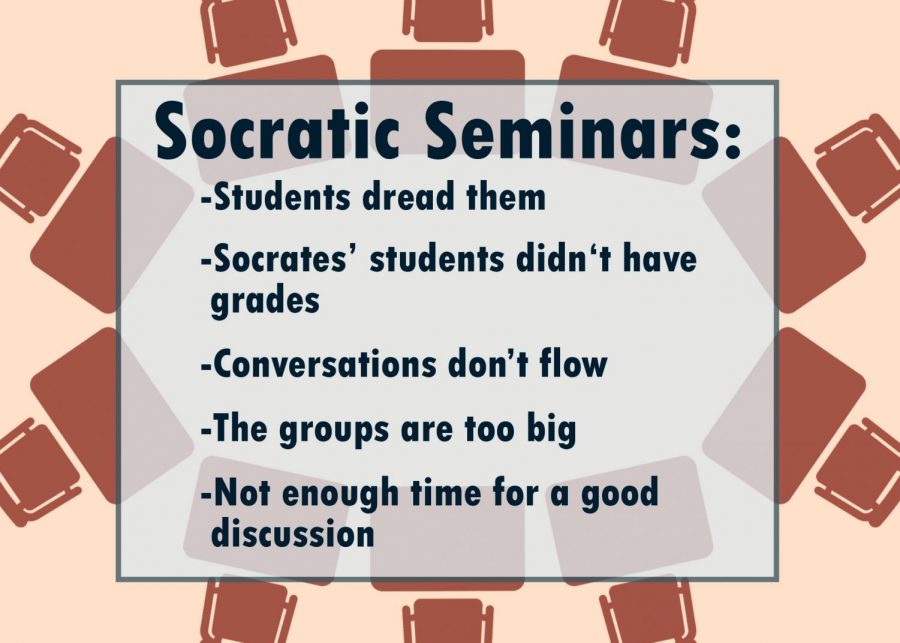Socrates didn’t die for this
To make discussions more productive, Socratic seminars shouldn’t be graded.
March 25, 2019
Seeing it on the calendar inspires dread from students; its predictable use by teachers is only matched by the inevitable awkward silences it produces.
The Socratic seminar—which at Whitman generally refers to a method of class discussions where students share ideas about a reading or topic—is used frequently as an assessment by teachers. While the discussions themselves can be valuable, their use as a method of examination is flawed. To facilitate more productive Socratic seminars, these discussions shouldn’t be graded.
The seminar gets its name from the Socratic method, developed by the legendary Greek philosopher. Socrates intended to create a natural dialogue between students, based on asking and answering questions to challenge students’ ideas and underlying presumptions.
The typically graded seminar falls far short of this purpose. Grading means students focus on their own performance, rather than prioritizing contributing meaningfully to the conversation or learning from their peers. Students end up trying to hit all the notes—perhaps citing a few loosely related quotes and trying to connect to a peer’s statement from 10 minutes ago—to say an “A” worthy insightful comment. While thinking through all of that, they don’t actually get a chance to listen.
A Socratic seminar is meant to be a fluid conversation, each comment building on the last. But the result of grading the discussion is a bunch of independent statements thrown out into the room, unrelated to the rest.
To make matters worse, these discussions usually include every student in the class or large portions of them. Students fight for airtime, as is natural when more comments generally equate to more points. This often shuts quieter students out of the conversation. Additionally, in a 45 minute period, there just isn’t enough time per person for meaningful back and forth conversation. Simply put, too many cooks spoil the broth.
Of course, there’s massive value to the concept of a class discussion. It forces students to articulate their own ideas and allows students to gain a better understanding of the topic than what could be achieved through lectures or reading. It’s easy to understand why teachers might be tempted to grade these discussions; however, the reality is that when conversations are graded the discussion becomes based around survival, not learning.
Admittedly, grading these discussions incentivizes everyone to contribute to the conversation. However, there is little value in pressuring an unwilling participant to scrap together a forced comment and save their grade. A better solution to getting every student involved is having students work in smaller, ungraded groups, eliminating both the pressure to make the perfect comment and the need to battle with classmates to speak.
In Socrates’ day, they didn’t have As and Bs. Instead, the ancient Greeks focused on the pursuit of knowledge. If we want to do the same, it’s time we stop grading Socratic seminars. Only then will these discussions mean more than a few points.









Ryan Clapp • Jan 23, 2024 at 10:42 am
Hi Will, as a teacher in Colorado who uses Socratic Seminars a lot, this was a really helpful article. I agree with a lot of your critiques; I try to keep mine to 5-7 students, with another 5-7 observing and the rest prepping out of the room. My grading is more based on responses to statements and evidence than the statements themselves. Otherwise, you do get a boring book report style one-off. Hope you’ve kept writing these past few years, you’re a natural.
Carrie Robertson • Feb 14, 2021 at 8:18 pm
Hi Will, I’m a teacher planning a Socratic Seminar discussion this week, and I really appreciate your insights into how students feel about this lesson format! It reminds me that I need to grade students on participation only, not on how much they talk, as a way to show that all discussion is valued, and to make sure every voice is heard, not just the loudest! I wish I could count on students to simply participate and (gasp!) learn things on their own, but alas, students are already trained to only exert effort when a grade is attached.
Ms. Rhue • Jul 6, 2019 at 12:47 am
Hi Will,
I really appreciate your perspective, as I am conducting research for an urban literacy project. Your experience helps to inform my project. Keep up the good work!